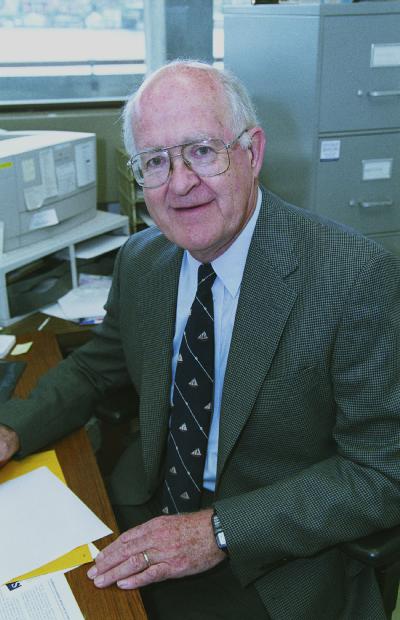October 21, 2004
Faculty Senate: A new year of cooperative work
The UW Faculty Senate — which holds its first meeting Oct. 28 — starts the school year eager to join new President Mark Emmert in creating an agenda for the University’s future, says G. Ross Heath, this year’s Senate chair.
On Aug. 1, Heath, a professor of oceanography and dean emeritus of the College of Ocean and Fisheries Sciences, stepped up from vice chair to chair of the Senate. Ashley Emery, a professor of mechanical engineering, is the new vice chair.
“Things are good, there’s lots of discussion and consultation,” Heath said of the current Senate. He said as it heads into a new year, the Senate’s focus will necessarily blend with President Emmert’s goals for the institution as they evolve, but that some issues remain from previous years.
He said the Senate needs to increase awareness of shared governance throughout the University, and will ponder the future of the UW’s Tacoma and Bothell campuses. Also, given trouble in the last year, the Senate needs to take a more active approach to its relation to intercollegiate athletics. And, as every year, faculty salaries and retention remain a concern — although perhaps slightly less intense this year due to a recent small salary increase.
Heath said the Senate’s Tri-Campus Task Force will look at possible futures for the UW’s three campuses. “What are the pros and cons? Should they be more separate, or more collaborative?”
He said he’d like to see the Senate work toward enhancing shared governance throughout the UW. Such an approach should work at all institutional levels, he said. He noted that the UW already has strong shared governance at the departmental level, but “there are still some soft spots at the college level.”
A recent facultywide salary increase of 2 percent “muted concern about salaries” for the moment, Heath said. But as the economy improves the UW will once again start losing people to other institutions if pay is not increased to be at or near market levels.
“We have to be competitive,” Heath said. Losing longtime faculty over pay concerns threatens the health of the institution, he said. He likened it to a community “eating the seed corn” that is essential for future years’ crops.
Heath feels that the Faculty Senate “dropped the ball” in recent years by not attending more closely to intercollegiate athletics, where negative headlines have abounded in recent months. He said the Senate’s advisory committee would likely be more active in this area this year. Heath said he’d like to see the Senate “a little more engaged than it historically has been” in such matters.
With groups such as the Faculty Senate, issues tend to continue from one year to the next. Such is the case with the UW’s concerns over the diversity of the faculty and the Reorganization, Consolidation and Elimination of Programs policy, or RCEP, which the Senate worked on last year when art professor Doug Wadden was chairman.
Heath said the Senate’s draft revisions of the policy have been discussed with the administration and are being further refined.
The UW’s last accreditation report stated the institution lacks sufficient goals for student achievement and and appropriate ways to measure progress toward those goals.
Heath said that this issue may be taken up this year, but the Senate’s role relative to other campus groups is yet to be determined.
And of course, Heath said, there remain ongoing concerns about funding at the UW.
“(Former UW President) Bill Gerberding always said, ‘This state has a much better university than it pays for,’ and that’s really true — this is an exceptional university,” Heath said. “Yet if you look at the state budget, you’d wonder, ‘How is that possible?’”
Shakespeare said some have greatness thrust upon them, and such seems to be the case with Heath’s new job. Heath said the Senate chairmanship is officially a part-time job, but is rarely limited to part-time hours or effort. “The last chair said he attended about 400 meetings during the year. There are not many days when you don’t have meetings.”



